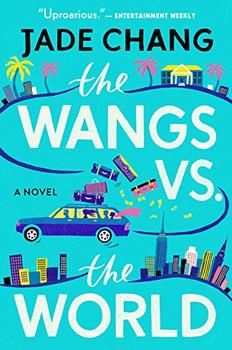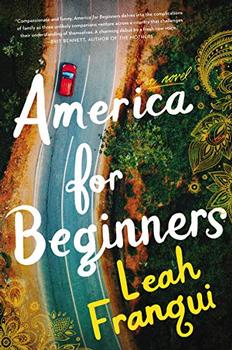Summary | Excerpt | Reading Guide | Reviews | Beyond the book | Read-Alikes | Genres & Themes | Author Bio

Critics' Opinion:
Readers' Opinion:
First Published:
Oct 2016, 368 pages
Paperback:
Jun 2017, 368 pages
 Book Reviewed by:
Book Reviewed by:
Rory L. Aronsky
Buy This Book
There's a scene late in The Wangs vs. the World, Jade Chang's spectacular first novel, involving Andrew, one of three financially fallen children of former cosmetics titan Charles Wang, which perfectly encapsulates Chang's writing style and the heights to which it soars.
In New Orleans, after a few tumultuous days on the road in a rapidly aging powder-blue Mercedes with his father Charles, his stepmother Barbra, and his teenage sister Grace, Andrew begins his third live open-mic performance (he was drunk during his second, and we don't talk about the first disaster in Austin, Texas) espousing the differences between Asians, asserting all the while that there are absolutely no differences between white people, no matter their nationalities. Having powered through that material, he realizes that it's time to be truly honest – about his trying past few days, about his romantic ideals about his virginity, about his family, about everything. There's no anger, no rancor, no animosity. It's a gentle, piercing truth.
That's Jade Chang. She has such fun in the first half of The Wangs vs. the World with the familial world she has created. Rooted in the beginning of the Great Recession in 2008, Charles defiantly started two high-end makeup stores to further promote his cosmetics lines, despite the market being ready to crash. This leads to the Wangs' belongings being seized, all their millions of dollars gone, and the family driving from Bel Air, California to Helios in upstate New York to eldest daughter Saina's farmhouse. There they will regroup, and Charles will investigate reclaiming ancestral family land in China, land that he believes could be another start to greatness for him, the life that he, by right, should have had if the Japanese had not invaded China, if Communism had not spread, and if a number of other things had not happened so long ago.
Chang not only uses situational humor well, but linguistic humor too. Early in the novel, Barbra gives up asking how Charles lost everything and, instead, plays with the words how and house – "No more how, and no more house." This kind of language play is a rare joy in novels, and it's a silken pleasure. Chang cleverly hones in on details, such as the strictly physical sense of sex, rather than the emotional sense, which eldest daughter Saina considers with her ex-boyfriend Grayson, who has come back. And chances are that you've never considered the plight of magazines in waiting rooms – fashion magazines and business magazines intermingling – but Chang does here. There's even room for the Mercedes to say its piece! Twice! It's as if you're sitting in Chang's living room, all the furniture pushed to the sides, watching her dance around the room unselfconsciously, freely flowing from a skip, to a leap, to a tumble, taking such joy in the dance. Ideas, images, actions all surprise the reader on the page.
But the second half of The Wangs vs. the World takes a turn. To continue the living room metaphor, it is now dark, all of Chang's furniture back in place, candles flickering on the table, and you're listening intently as she solemnly spins the story further. The Wangs' new life begins to sink in. Andrew performs his stand-up comedy, Saina copes with losing her crème de la crème status in the New York City art world, and Charles gets closer to the China that he only really knew from Taiwan. The truth that the Wangs face, as they begin their lives again, is also the truth we all must face – when everything else is gone, who are we really? Change creates moments of deep consideration about what is actually art, who every immigrant is in this world – "the person he might have been and the person he is" – and how one jolting event can change your worldview, and split you wide open to the possibilities of life that were once missing.
In just one novel, with the Wangs barreling down I-10 East to wherever life begins again for them, Chang has established a delightful, lasting relationship with readers. Wherever she goes next will be worth following.
![]() This review was originally published in The BookBrowse Review in November 2016, and has been updated for the
June 2017 edition.
Click here to go to this issue.
This review was originally published in The BookBrowse Review in November 2016, and has been updated for the
June 2017 edition.
Click here to go to this issue.

If you liked The Wangs vs. the World, try these:

by Valeria Luiselli
Published 2020
From the two-time NBCC Finalist, an emotionally resonant, fiercely imaginative new novel about a family's road trip across America--an indelible journey told with breathtaking imagery, spare lyricism, and profound humanity.

by Leah Franqui
Published 2019
Recalling contemporary classics such as Americanah, Behold the Dreamers, and The Brief Wondrous Life of Oscar Wao, a funny, poignant, and insightful debut novel that explores the complexities of family, immigration, prejudice, and the American Dream through meaningful and unlikely friendships forged in unusual circumstances.





The House on Biscayne Bay
by Chanel Cleeton
As death stalks a gothic mansion in Miami, the lives of two women intertwine as the past and present collide.

The Flower Sisters
by Michelle Collins Anderson
From the new Fannie Flagg of the Ozarks, a richly-woven story of family, forgiveness, and reinvention.

The Funeral Cryer by Wenyan Lu
Debut novelist Wenyan Lu brings us this witty yet profound story about one woman's midlife reawakening in contemporary rural China.
Your guide toexceptional books
BookBrowse seeks out and recommends the best in contemporary fiction and nonfiction—books that not only engage and entertain but also deepen our understanding of ourselves and the world around us.